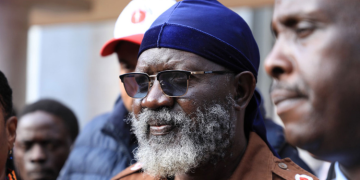Celebrated Kenyan journalist Linus Kaikai is among 916 individuals listed for admission as Advocates of the High Court of Kenya.
Kaikai’s name appeared in Kenya Gazette Notice No. 15232, published on October 26, 2025, under the Advocates Act (Cap. 16).
“Pursuant to section 15(2) of the Advocates Act, the public is notified that the following nine hundred and sixteen (916) persons have petitioned for admission as Advocates of the High Court of Kenya. Any member of the public or institution who wishes to object to the admission of any of the persons named herein under to do so in writing to the Chief Registrar of the Judiciary within thirty (30) days of this notice,” the notice reads in part.
The notice, signed by the Chief Registrar of the Judiciary, confirms that the petitions for admission are now open for public before the Chief Justice presides over the official admission ceremonies.
Kaikai, who is currently Editorial Director at Royal Media Services, has long been one of Kenya’s most respected media voices, with more than 20 years of newsroom experience.
Soon-to-Be Advocate
His journalism career spans over two decades, having begun at the Kenya Television Network (KTN), where he earned the prestigious CNN African Television Journalist 1st Prize in 1997.
Under Section 15(3) of the Advocates Act, the Chief Justice must hear the petitions within 90 days of gazettement.
Upon successful vetting, Kaikai and his fellow petitioners will take the oath before the Chief Justice and sign the Roll of Advocates, officially joining the legal fraternity.
Also Read: Oburu Under Fire for Attending Wedding Soon After Raila Burial
Linus Kaikai holds a master’s degree in International Journalism from Masinde Muliro University of Science and Technology.
An Advocate of the High Court of Kenya is a legally qualified professional who has been admitted to the Bar and authorized to practice law before any court in Kenya.
Once admitted, an advocate can represent clients, draft legal documents, offer legal advice, and perform all duties related to the practice of law.
Being a “soon-to-be Advocate” means a candidate has completed all academic, professional, and regulatory requirements and has petitioned the Chief Justice for admission, but has not yet taken the Oath of Admission or signed the Roll of Advocates.
Process of Being an Advocate of the High Court of Kenya
A candidate must first obtain a Bachelor of Laws (LL.B.) degree from a recognized university, either in Kenya or abroad and ensure the qualification meets the Council of Legal Education (CLE) standards.
You must enroll at the Kenya School of Law (KSL) for the Advocates Training Programme (ATP), which is the final professional step before practice.
The program includes both coursework and a six-month pupilage (internship) at a law firm or under a practicing advocate.
Students are tested in nine core subjects and must pass the Bar Examination administered by the Council of Legal Education.
Also Read: How KDF Cornered 6 Iranians on a Vessel with Ksh 8.2B Worth of Meth
Upon successfully completing the ATP and passing the Bar exams, candidates petition the Chief Justice through the Chief Registrar of the Judiciary for admission as Advocates of the High Court.
Their names are then gazetted and published in the Kenya Gazette for 30 days, allowing the public or any institution to object to their admission if there are valid reasons (e.g., ethical concerns).
The Chief Justice (or a delegated judge) hears the petitions within 90 days of gazettement. This is a procedural step where each petitioner’s qualifications are confirmed.
Once approved, the petitioners take the Oath of Admission and sign the Roll of Advocates, a formal registry maintained by the Judiciary.
From this moment, they can legally practice as advocates in Kenya.
Follow our WhatsApp Channel and X Account for real-time news updates.












































































